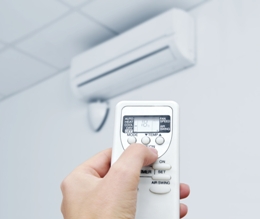17 December 2014
 A national medical energy concession program should be introduced to assist people with multiple sclerosis (MS) and other conditions which result in medical need for increased air conditioning use, UniSA research recommends.
A national medical energy concession program should be introduced to assist people with multiple sclerosis (MS) and other conditions which result in medical need for increased air conditioning use, UniSA research recommends.
Dr Frank Bruno, Leader of the Thermal Energy Storage Group within UniSA’s Barbara Hardy Institute, in partnership with MS Australia has investigated air conditioning use among people with MS – and found it to be significantly higher than the average person.
While various states including SA have their own medical energy concession schemes, Dr Bruno says a national program would improve ease of access for consumers and simplify administration for energy retailers and governments.
He says using air conditioners – which are usually the major energy consuming household appliance – is a medical necessity for people with MS.
“Heat intolerance is a major problem for people living with MS,” Dr Bruno says.
“When their core body temperature increases even as little as 0.2 to 0.5 degrees Celsius, people with MS experience significantly increased symptoms which greatly reduces their capacity to participate in social, household and work activities, as well as increasing their need for pharmaceuticals and medical services.”
Along with UniSA colleague Adjunct Associate Professor Monica Oliphant, consultant for MS Australia Dr Michael Summers and David Whiting Energy Solutions, Dr Bruno found MS households used on average about 16.8 per cent more electricity in summer and 10.5 per cent more electricity in winter than the state or post code average.
However, if homes with solar PV were removed from the survey sample, MS households used 32 per cent more electricity in summer. Staggeringly, around 60 per cent of non-solar MS households were using on average 80 per cent more electricity in summer than their postcode average. The non-solar homes had annual combined electricity and gas bills of up to $5950.
In his report for the Consumer Advocacy Panel, which facilitates customer advocacy in the national electricity and gas markets, Dr Bruno states the feasibility of developing a single national medical energy concession to assist those with medical need to keep cool in summer and warm in winter should be examined by an appropriate national body such as the Council of Australian Governments (COAG) Energy Council.
“National uniformity would improve clarity and ease of access for consumers with a need for medical energy concession,” Dr Bruno says.
“It would also simplify administration for energy retailers and governments.
“Importantly, it would create significant incentives for governments to strengthen and better target energy efficiency improvements to households eligible for medical energy concession, thereby ultimately reducing costs for all stakeholders.”
Dr Bruno says current energy concessions vary quite significantly between states and territories and can only be received by eligible concession card holders.
He suggests the current Victorian medical energy concession utilising a percentage of the energy bill rather than a daily rate is the fairest approach.
The report also suggests current state and territory government energy efficiency schemes should include programs and initiatives that specifically target households with high energy needs as a consequence of medical need.
Dr Bruno says as many other conditions besides MS – such as Parkinson’s disease and spinal cord injury – result in medically required energy use, further research on the issue should be undertaken.
The report can be viewed here.
Contact for interview: Dr Frank Bruno office (08) 8302 3230 mobile 0413 853 257 email frank.bruno@unisa.edu.au
Media contact: Kelly Stone office 8302 0963 mobile 0417 861 832 email Kelly.stone@unisa.edu.au


